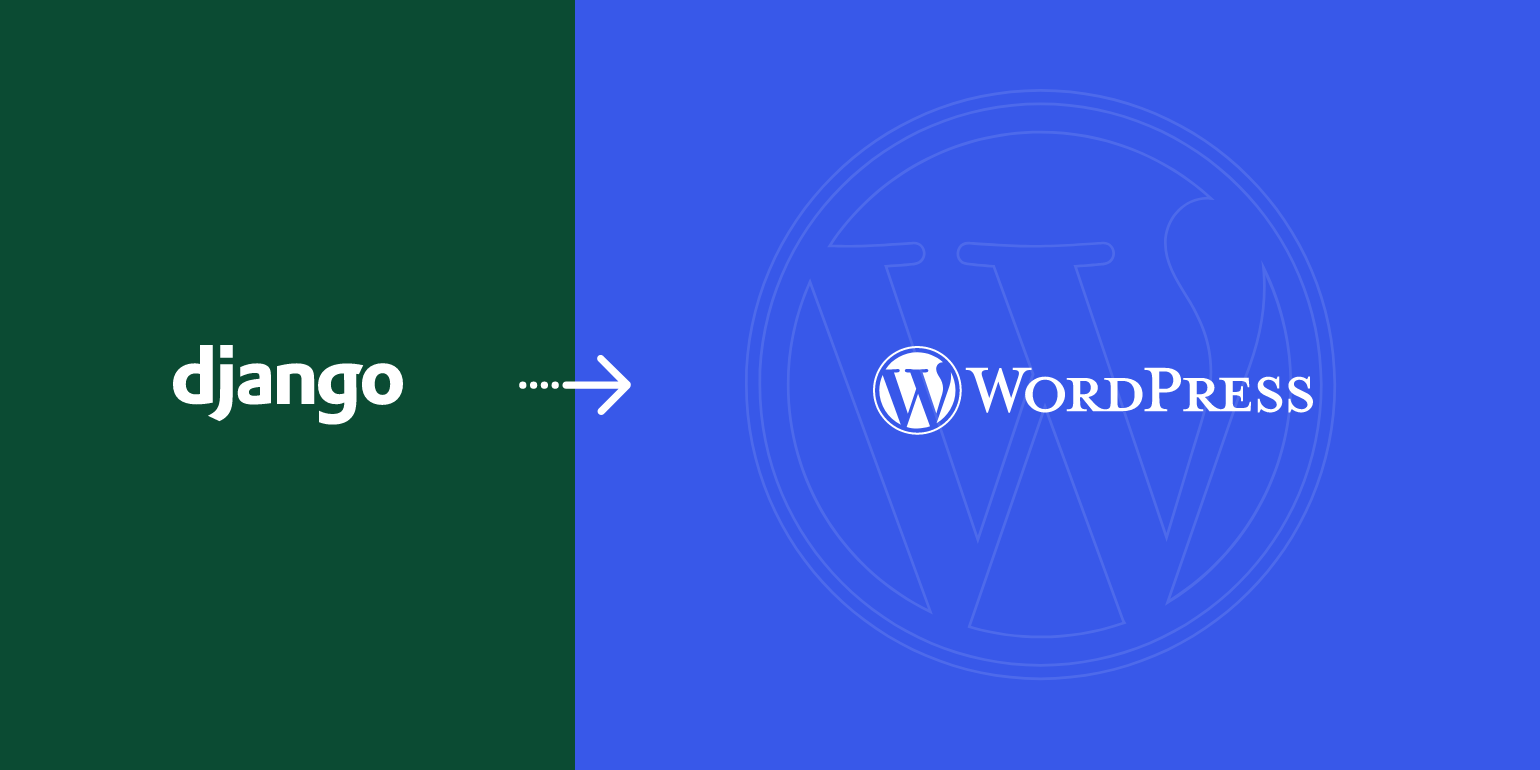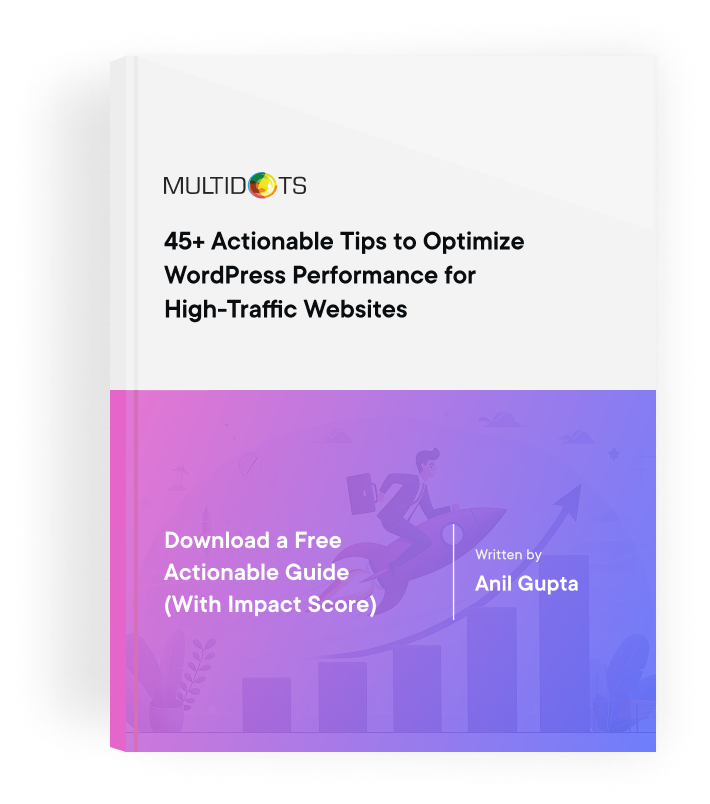How to Migrate Django Website to WordPress – The Ultimate Guide
An ultimate guide on migrating your Django website to WordPress for a smooth and efficient transition

Table of Contents
Both Django and WordPress are popularly used content management systems. However, like all systems, there are plenty of differences between the two and to put it simply, WordPress towers over Django, when it comes to usage, features, power, security and on many other parameters that separate the best website framework from the rest.
Django CMS vs WordPress CMS
Take a guess. How many websites, do you think are powered by WordPress? The figure is 38%, and this comes from the WordPress website itself. On the other hand, less than 0.1% websites use Django. These figures alone give you the true picture of which CMS is the clear winner and why you must move your website from Django to WordPress.
Here are some other statistics that you should look at:
One of the biggest reasons why website migration from Django to WordPress makes an infinite amount of sense is because of the ever-growing WordPress development community. The platform is constantly evolving courtesy the huge number of plugins and extensions that are being developed and which can be used to extend website functionality. Your WordPress website will get better and better, while there is a chance that the Django website will remain stagnant.
Django is not easy to use or customize. It has a monolithic framework and developers have to write a lot of code, considering it has fewer dependencies. Comparatively WordPress has more dependencies, doesn’t demand as much coding and more importantly it ensures the available plugins are easy to use. And most importantly, you can use WordPress to create all manner of sites right from personal websites to SMB websites and enterprise level websites.
You must convert Django to WordPress considering that WordPress websites can scale to meet the growing needs of your business and more importantly are extremely easy to use and maintain. This isn’t true for Django websites as their maintenance require a steep learning curve.
But one of the biggest differences between Django and WordPress is that the former is built on Python, while the latter is a PHP-based framework.
Python vs. PHP
Let’ talk about PHP first.
PHP stands for Hypertext-Preprocessor and it is a server-side scripting language that made its appearance on the scene in 1995. Since then it has been actively used for the creation of HTML content and all those flash animation, PDFs, dynamic websites and a whole lot more. The reason for its popularity is it is ease of use and the fact that a large number of popularly used databases such as MySQL, Oracle, Microsoft SQL and more are integrated with it.
Python was released in 1991, a few years before PHP and is highly regarded as a general-purpose programming language. It accelerates development courtesy its built-in data structures coupled with dynamic typing and binding. You can see python being extensively used in machine learning applications, and wherever there is a demand for complex programming and computing. Some of the world’s biggest and more popular applications are built on Python.
Comparison between Python and PHP
| Aspect | PHP | Python |
|---|---|---|
| Learning Curve | Low learning curve and beginners can easily get confidence. | Steeper learning curve owing to its applicability in more complex and scalable use cases. |
| Number of frameworks | If popularity of a language can be gauged from the number of frameworks the language is used in, then PHP wins hands down. Some popular frameworks are WordPress, Laravel, CakePHP etc. | Python is used in comparatively lesser number of frameworks, including Django, Flask, TurboGears etc. |
| Speed | There is no doubt that PHP wins hands down because of faster database queries | Python applications are slower because of slower code execution time and its dynamic typing increases the number of operational steps. |
| Syntax | Very similar to human language and therefore easy to learn – low learning curve. | Higher number of naming conventions makes the syntax difficult to get comfortable with. |
| Maintenance | Very easy to maintain and therefore a preferred option for website development. | Comparatively a little difficult to maintain owing to its complex nature. |
| Debugging | Awesome debugger that helps identify bugs and get rid of them. | Equally good debugger that ensures bug identification and remediation happens quickly. |
| Documentation | Robust documentation site that is easy to use and place comments on. | Documentation process is good, the only difference is that developers cannot place comments. |
So, what’s the final word? Does PHP score over Python or vice versa. It is a toss up really, but the key here is the framework. The problems with a language are carried over to the framework and this is what has happened in the case of Django. The reason why Django to WordPress conversion makes sense is that the limitations of Python are nullified due to the extensive capabilities of PHP.
How to Choose the Best Language for Your Web Development?
This is a very interesting question because there are no easy answers. But there is no beating the value of statistics, in order to get the right answer. So, let’s take a look at a few:
69.7% of professional developers prefer using JavaScript, more than half of then prefer using SQL and so on and so forth. So, you get an idea of how programming languages are being used. But let’s take a drill down and see how programmers choose the perfect language for a project:
Application
The type of application you are building whether a web app, mobile app, firmware etc. has a huge role to play in choosing the right language. Ideally, pick a language that can help you build apps for different platforms.
Ease of Use
The easier the language, the faster the web development. You mustn’t pick a language that consumes a lot of time because of its complex syntax. E.g. PHP is very easy to use and therefore the coding process is much faster.
Frameworks
The popularity and usability of the language can be evaluated by the framework the particular language is used for, and the popularity of those frameworks. In this particular case, WordPress a PHP based framework is far more popular than Django, a python-framework.
Documentation
What do you do, if you face a programming issue? Is there help available? This is where documentation comes in, and you must choose a language for which tons of documentation is easily available. In case, you encounter a problem, the documentation can help solve it.
Growing Ecosystem Support
This is related to the earlier point. The amount of available documentation is directly proportional to the nature of its ecosystem. Choose a language which has a large ecosystem that is constantly providing updates to better the language.
Project Size and Complexity
Size matters. If you want to build a large and complex site with a large amount of data sets and integration, a language purpose built for developing such projects must be chosen. A case in point being PHP. This means you can easily integrate a CMS such as WordPress to create the kind of website you want, irrespective of size.
Hassle -Free Maintenance
PHP is very easy to maintain courtesy it’s huge ecosystem of libraries. This is why CMS to CMS migration from Django to WordPress, makes sure that your site can now be maintained easily, and the support costs go down dramatically.
Security Perspective
In a world where your website will be in the crosshairs of attackers and must meet stringent compliance regulations, choosing a secure language is par for the course. It is imperative that you avoid the limitations of monolithic languages and leverage the benefit of dynamic languages.
Why PHP?
See that figure. It tells you PHP is miles ahead of other languages when it comes to usage. It is used by 78.9% of websites. Why? Let’s take a look:
Open Source Language
The biggest benefit of this language is that its open source and not proprietary. The web development costs immediately come down because its free to use, and you are not dependent on the vendor to come up with upgrades and pay through your nose for it.
Platform Agnostic
Your web application can adapt to the meet the needs of all browsers as it has cross-platform compatibility. You can add as many features and functionalities knowing that the web app is going to perform smoothly.
Flexibility in Database
You have a choice of connecting numerous databases such as MySQL, Oracle, SQLLite, and more, which means developing scalable applications becomes very easy. Again, a reason why Django to WordPress conversion makes sense.
The Library Advantage
The fact that it is open source means there are plenty of libraries available and you can choose the necessary modules that can enhance the functional attributes of your website. A huge reason why it is the preferred language for websites.
High on Performance
Based on a PHPNG engine, PHP 7 achieves a high rating on the performance scale and is an improvement over the earlier PHP interpreter. Pages are returned with twice the speed, which means pages are loaded quickly.
Super HTML Compatibility
Synchronization between HTML and PHP is absolutely top-class, and there is no interference between the two. PHP complements the working of HTML, which has an impact on the quality of your website.
Why Migrate Django CMS to WordPress?
You must switch to WordPress from Django. Here’s why:
Difficult to Maintain
First and foremost, a Django website is really difficult to maintain considering the tight coupling of its various components. This means maintenance is components-based which can result in complexities and errors. WordPress on the other hand, keeps its components loosely coupled, which makes maintenance easier.
Outdated Functionality
If you want to build a website with all the contemporary features in place, that your target user expects, then Django’s outdated modules won’t get the job done. What you need are the huge number of plugins and extensions available on WordPress, that can be used to achieve a range of functionalities.
Limited Creativity
The monolithic and pattern intensive nature of Django means you might not be able to give full vent to your creative pursuit. This means the website does not look and feel the way you want it to, which is not a problem in WordPress at all. With WordPress, you can control the functional and visual appeal of your site.
Slower Website
Speed is a problem in Django, because Python, the language it is built upon, is not very fast. So, you might have to compromise on certain website aspects to improve website loading speed. WordPress on the other hand is driven by PHP which is known for its speed which makes your WordPress website fast.
Not a Right Fit for All Websites
Django is not the right choice for small websites as some of the advanced features of Django can impact the functionality of some of the sites. However, WordPress caters to the requirements of all sites, and features integration via extensions and plugins is a seamless exercise.
The Django ORM System
Developers can use Django’s ORM system for connecting Django to different databases; unfortunately, the ORM is quite limiting as compared to other ORMs meaning developers have their work cut out for them; this can result in slower development and probably more errors.
7 Things to Keep in Mind Before You Move Django to WordPress
A smoother transition from Django to WordPress can be achieved through careful planning. Here are the 7 things you must keep in mind:
- The first aspect to consider is website continuity. It is imperative to inform users that you are in the process of website migration and the website might not be available for a limited amount of time.
- Take stock of your Django website and identify what you want to move and what you don’t want to move. There might be a case where you do not want to move all data to your new home on WordPress. A thorough audit will help you zero in on the essentials and non-essentials. So, check whether you want to migrate the whole site lock, stock and barrel, or just some of the files or all your database.
- Check whether you want to move to new a domain name. If yes, set it up before you start migration. The new domain must be up and running before you start the migration process.
- WordPress installation on the new domain is a must as this kickstarts the WordPress migration process.
- You can only use your new domain for migration if you have your FTP credentials, so keep these handy.
- The most important must-do item before you migrate is taking backup of your Django website, so that you have all the data at your disposal.
- You must have done loads of SEO work for your Django website, and it is imperative that you don’t lose your SEO ranking during migration. So, make sure you are able to duplicate all your SEO effort in the new WordPress site.
Django to WordPress Migration Process
It is important that you work with an expert and experienced Django to WordPress migration services provider, to guarantee seamless migration. Here’s the comprehensive process:
- Django Website Evaluation
Take a close hard look at your Django website and identify what you want to move right from its files, databases to special icons, links, images, sliders and more. This process can take a lot of time, especially if you want to move a large database heavy Django website to WordPress. So, make sure you have a very clear idea of the website components you want to migrate to WordPress. - WordPress Installation
Your WordPress programmers will install WordPress on the new domain or on an offline server. The WordPress Settings will be configured and they will also configure your navigation structure, user accounts and deploy your chosen WordPress themes. If the theme has a custom setting, with respect to menus, styles and more these will be chosen and set up. The WordPress migration services at this stage also include choosing the right plugins and widgets that will add the functionalities you want. - Content Import
This is the critical stage of transition to WordPress from Django as the process of content import now begins, and no prizes for guessing that all the files, databases and content you have identified for migration will now be imported to your new WordPress installation. The focus, will be on site files and databases and it is important that you hire a migration expert for the job only, as you don’t want a situation wherein you miss out on some files or data. - Test your WordPress Website
Before going live with your website, it is imperative that you are able to test your WordPress site from the design and usability perspective. You want to ensure that the features function as per expectations; there is no data loss and every aspect of the website is performing smoothly.
5 Best plugins to use after Django to WordPress Migration
Here’s a list of plugins that you must deploy after Django to WordPress conversion:
- Yoast SEO
Get your new WordPress website in order with Yoast as it delivers tremendous SEO value. Right from real-time page analysis to automatic URL generation and much more, if you want your WordPress site to rank on SERPs this is the plugin for you. - WP-Rocket
While your WordPress’ website speed will be good, you should always keep trying to improve its speed and this is where WP-Rocket comes in handy. This is a caching plugin, that caches your pages thus boosting your site speed. - UpdraftPlus WordPress Backup Plugin
This is a great backup and restoration plugin that allows you to backup data directly into Dropbox, Amazon S3 and more. You need to integrate this type of plugin to ensure you always have website data backup on hand in case of a problem. - MalCare
This one is a great security plugin that protects your website from malware through a comprehensive malware removal tool and a firewall that protects your website against data breach. Remember, you need advanced network protection to secure your site from threats that exploit network weaknesses. - Social Locker
Your website needs a good social media WordPress plugin that not only helps people share your content easily, but also gives them a valid reason to share your content. E.g. if a user shares content on your website, you can reward the user by unlocking a gated asset such as a whitepaper or eBook.
Things to consider after your WordPress Website Goes Live
- Make sure that your website is visible in Google SERPs, that means allow Google to index your website.
- We have talked about installing a backup plugin; this should be done in mission-critical mode.
- Keep making onsite improvement to enhance website performance.
- Integrate Google Analytics into your WordPress website so that you can track website performance.
- Caching mechanisms need to be set up and we have discussed a plugin you can use for the same.
Wrapping it Up
As a business, it is imperative that your website delivers high ROI. But it won’t deliver the value you are looking for, if it does not perform as per user needs and expectations. With our WordPress migration services, we can effectively migrate Django CMS to WordPress to ensure your website experiences all the benefits that WordPress brings to the table. Over the long term, this can directly impact your websites conversions and result in business profitability.
Feel free to schedule a quick call with our migration expert.
Contact Us
